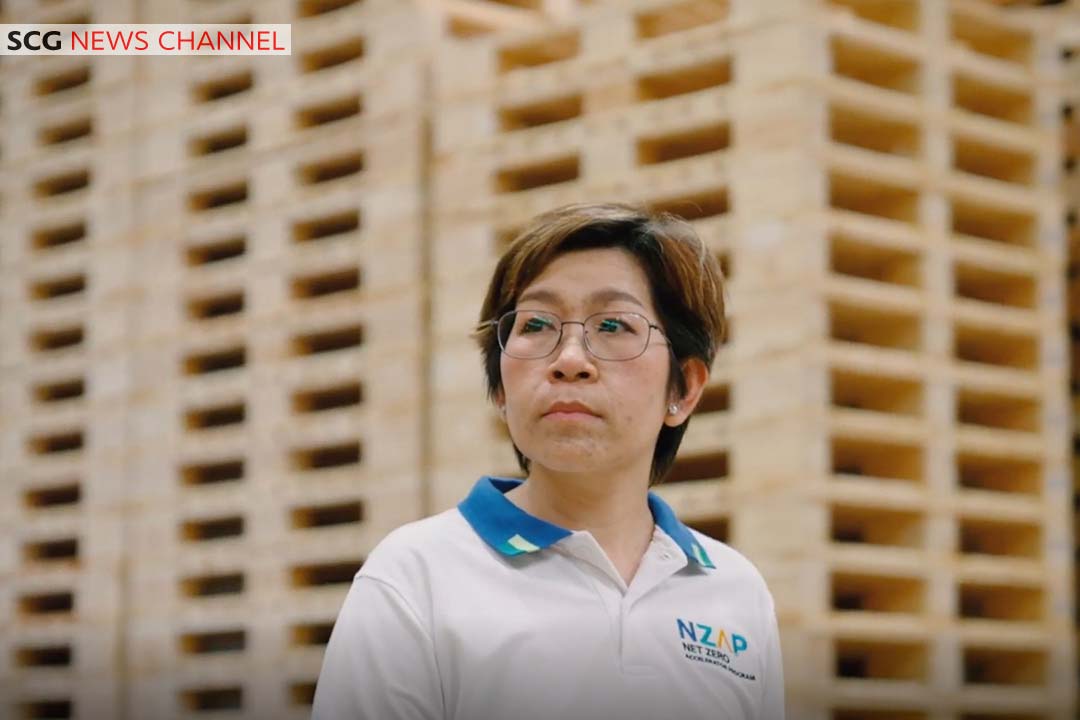The world currently faces extreme climate conditions, serving as a warning signal for everyone to begin adapting toward a “low-carbon society” starting today for long-term survival and sustainable growth. SMEs, which form the foundation of Thailand’s economy, represent a crucial mechanism in the transition to a low-carbon society. For this transformation to truly occur, all sectors must unite their efforts. SCG has collaborated with government agencies, private sector organizations, and partner networks to advance two key projects: the Net Zero Accelerator Program 2026 (NZAP 2026) and the Go Together Season 2 project. These initiatives support SMEs in adapting and enhancing their competitiveness while concretely transitioning to low-carbon business operations.
“Pallet Maker Group”: An SME Success Story
Pallet Maker Group Co., Ltd., a wooden pallet manufacturer for export, exemplifies the success of SMEs participating in SCG’s NZAP 2026 and Go Together projects. The company has committed to transitioning to low-carbon business operations, which is not merely an option but a long-term survival strategy amid comprehensive challenges. As the world enters an era where carbon becomes a critical indicator, global trade regulations become more stringent, and major clients demand new standards.
Ms. Tipawan Jiamcharoen, General Manager of Pallet Maker Group Co., Ltd., stated that current signals indicate it is time to take action on environmental matters. Without business transformation, survival becomes questionable, even with good product quality and pricing. Recently, customers have begun inquiring about carbon footprints, and lacking answers could result in lost business opportunities. However, the transition presents numerous challenges, starting with where to find knowledge, funding, and technology issues, making it difficult to envision and feeling too overwhelming to accomplish independently.

Taking Action with Understanding: Start Today to Stay on Track
Participating in SCG’s NZAP NET ZERO training program provided a global perspective on how the world views NET ZERO and carbon issues. It also revealed what fellow SMEs were doing. Through this learning process, the company discovered that some existing practices already addressed these concerns, such as solar cells, which they expanded into Phase 2, or converting wood waste into energy for wood drying processes. Additionally, they began collecting carbon footprint data and managing environmental matters. While investment is required, they view it as a long-term cost reduction strategy that ultimately meets customer demands.
“We can proudly respond to customers that we have addressed environmental concerns. This represents hidden business opportunities, potentially attracting new customer groups that prioritize green practices. Today’s world continues evolving, and without taking action, we will miss the train. Transformation is possible. We must begin with understanding, then take action, and importantly, have good companions along the journey, because every transformation requires networks. It cannot be done alone. The transition to a low-carbon society involves government, private sector, and networks working together to drive change,” Ms. Tipawan explained.
Uniting Forces through Knowledge Exchange
Dr. Chana Poomee, Chief Sustainability Officer, SCG at SCG, summarized: “SCG views SMEs as partners in national development through two projects: the Go Together project for growing together toward a sustainable world, allowing entrepreneurs to observe SCG examples across regions, and the NZAP 2026 curriculum that brings together government, private sector, and even banks. This creates knowledge exchange and transfer, which is extremely important. We firmly believe in the potential of SMEs within Thai industry to transform into crucial engines for Thailand’s economic development and create opportunities for investors to invest in our country.”

SCG remains committed to supporting Thai SMEs in their concrete journey toward sustainability. The transition to low-carbon business represents both opportunities and challenges in contemporary business operations. Moreover, this is no longer a distant concern. Through collaborative efforts from all sectors providing comprehensive support including knowledge, funding, and practical adaptation platforms, along with network partnerships, this transformation becomes achievable.
Published on: Sep 16, 2025